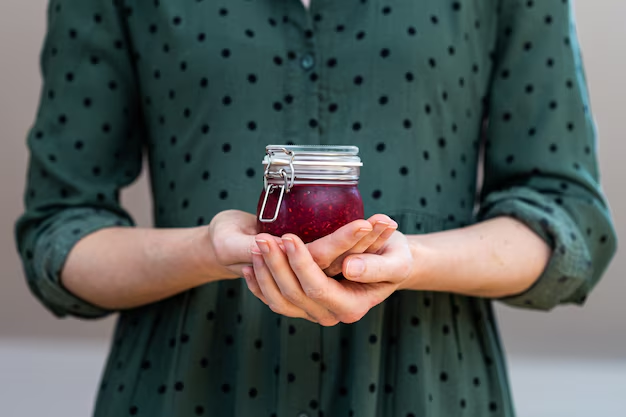Are Refrigerator Pickles Packed with Probiotics? Unpacking the Myths and Facts
🥒 Pickles have long been a culinary favorite, satisfying our taste buds with their tangy, crunchy goodness. But beyond their zestiness, a question often arises: Do refrigerator pickles contain probiotics? This curiosity stems from the growing interest in gut health and the role probiotics play in maintaining it. Dive into the jar with us as we explore this intriguing question, uncovering the secrets of refrigerator pickles and their potential probiotic prowess.
Understanding Refrigerator Pickles: A Quick Primer
Before sifting through the science of probiotics, it’s essential to grasp what refrigerator pickles are and how they're made.
What Exactly Are Refrigerator Pickles?
Refrigerator pickles are cucumbers or other vegetables preserved in a vinegar-based solution. Unlike fermented pickles, they aren’t left out at room temperature to undergo a natural fermentation process. Instead, they’re stored in the fridge and are typically ready to eat within a few days to a few weeks.
How Are They Made?
Here's a basic breakdown of the making process:
- Ingredients: Cucumbers, vinegar, sugar, salt, and spices.
- Preparation: The vegetables are sliced and packed into sterilized jars.
- Brining: A vinegar brine is poured over them.
- Refrigeration: The jars are sealed and kept in the fridge to develop flavor.
✨ Quick Tip: Always use a clean container and fresh ingredients to prevent spoilage.
Probiotics 101: What You Need to Know
To tackle whether refrigerator pickles contain probiotics, it's crucial to understand what probiotics are.
What Are Probiotics?
Probiotics are live microorganisms that provide health benefits, particularly for the digestive system, when consumed in adequate amounts. They can be found in certain foods and supplements, and are known to:
- Support gut health: Balancing the gut flora.
- Boost immunity: Enhancing immune responses.
- Aid digestion: Helping break down food.
Common Sources of Probiotics
- Fermented Dairy: Yogurt and kefir.
- Vegetables: Kimchi and sauerkraut.
- Fermented Beverages: Kombucha.
Not All Pickles Are the Same
While some pickles can contain probiotics, not all do. It largely depends on the method of preparation.
Do Refrigerator Pickles Have Probiotics?
The million-dollar question: Do refrigerator pickles contain the beneficial probiotics we hear so much about?
The Role of Fermentation
Fermentation is key to probiotic development. It’s a natural process where microorganisms convert sugars into acids, gases, or alcohol. Traditional pickling (fermentation) involves lactic acid bacteria, which can thrive and produce probiotics.
- Fermented Pickles: These are left at room temperature to allow natural bacteria to work, potentially resulting in live probiotics.
- Refrigerator Pickles: Made with vinegar, which acts as a preservative, eliminating the environment needed for fermentation and consequently, probiotic growth.
Vinegar vs. Fermentation
The use of vinegar in refrigerator pickles creates an acidic environment unfavorable for live bacteria development. Thus, refrigerator pickles generally do not contain the same live cultures found in truly fermented pickles.
Potential Nutritional Benefits of Refrigerator Pickles
Though fridge pickles might lack probiotics, they still have other health benefits.
Nutritional Consistency
- Low-Calorie Snack: A crunchy snack option with minimal calories.
- Vitamins and Minerals: Contains essential nutrients like vitamin K and potassium.
- Hydration: High water content due to cucumber base.
Health Perks Without Probiotics
- Digestive Aid: Vinegar-based pickles can assist digestion.
- Regulating Blood Sugar: The acetic acid in vinegar may help stabilize blood sugar levels.
- Antioxidants: Additional herbs and spices can provide antioxidants.
🥒 Key Takeaways
- No Probiotics: Refrigerator pickles usually don’t contain live probiotics due to vinegar.
- Healthy Snack: Despite lacking probiotics, they’re a nutritious addition to the diet.
- Flavorful Addition: Enjoy for their taste and potential mild digestive benefits.
How to Incorporate Probiotics into Your Diet
If probiotics are what you're after, you might need to look beyond refrigerator pickles. Here are some ways to introduce more probiotics into your diet.
Explore Fermented Foods
- Homemade Pickles: Try making naturally fermented pickles at home.
- Sauerkraut or Kimchi: Easily accessible and packed with beneficial bacteria.
- Probiotic Yogurt: Opt for plain yogurt with live and active cultures.
Consider Probiotic Supplements
If dietary sources are insufficient, probiotic supplements can be a convenient option. Choose those with a variety of strains for maximum benefits.
Hygienic Practices for DIY Fermentation
- Sterilize Jars: Prevent contamination during fermentation.
- Maintain Temperature: Adhere to recipes for ideal temperature and time settings.
Enhancing Your Experience: Tips for Better Pickles and Gut Health
To maximize your refrigerator pickle experience while also fostering gut health, consider these expert tips.
Crafting Better Pickles
- Fresh Ingredients: Use the freshest cucumbers to improve taste and texture.
- Right Spices: Experiment with dill, garlic, and mustard seeds for flavor.
- Taste Test: Regularly taste your pickles after a few days to achieve the perfect flavor.
Boosting Gut Health
- Balanced Diet: Combine various sources of fiber and fermented foods.
- Stay Hydrated: Ample water aids in digestion and nutrient absorption.
- Mindful Eating: Chew foods thoroughly to improve digestion and nutrient uptake.
Final Thoughts: Navigating the World of Pickles and Probiotics
In the end, while refrigerator pickles might not deliver the probiotic punch you were seeking, they remain a delicious and healthy snack option. Understanding the distinction between vinegar-based and naturally fermented pickles can guide better dietary choices, aligning with your health goals. Experiment with making different types of pickles, explore the broad world of fermented foods, and enjoy the flavorful journey toward enhanced gut health.
📝 Summary and Practical Tips
- No Probiotics Here: Refrigerator pickles lack probiotics due to vinegar preservation.
- Healthy Choice: Still offers health benefits beyond just probiotics.
- Flavor Your Diet: Incorporate other probiotic-rich foods and supplements.
- DIY Fermentation: Try your hand at making fermented pickles at home for added probiotics.
🥒✨ Whether you prefer refrigerator or fermented, pickles are all about balancing tangy flavors with health benefits, making them a cornerstone of any flavorful cuisine exploration. Enjoy the crunch!

